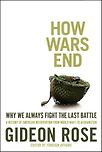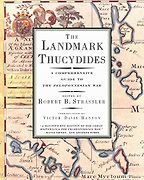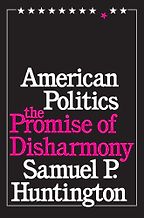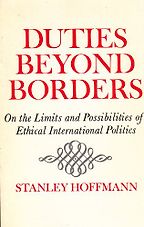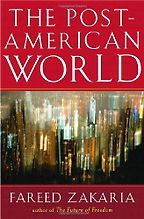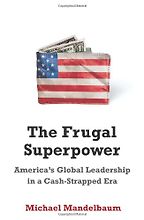American foreign policy is something almost everyone around the world has an opinion on, and that opinion is normally fairly critical. But at the end of the day, many of those criticisms don’t correspond with one another, and there’s a fair amount of ignorance about what’s really driving it. For example, if you asked 10 people why the US went into Iraq, you’d probably get 10 different answers. Can you explain what, in your view, it’s all about?
The first place to start in analysing foreign policy – as with all public policy – is with what I call “Rose’s first law of foreign policy”, which is that all policies are lousy but some are lousier than others. The real question professionals grapple with is not whether a particular policy is good – because it rarely is – but whether it is less bad than all the other possible options out there, in terms of whatever metrics you’re using: protecting/advancing your interests, helping the world, heading off disasters etc. This gets to your question – lots of people are critical of American foreign policy but the criticisms vary – and the answer is not whether something is wrong with a particular policy, but whether the alternative policies that are plausibly available net out any better. And the answer is usually not.
That’s why, in certain respects, there has been so much continuity in American foreign policy over such a long period of time. It actually has a far more sensible logic than people really appreciate, and is managed by relatively sensible, intelligent professionals, far more, again, than most people appreciate. That doesn’t mean there aren’t major screw-ups. But there are fewer than people think and the decisions behind them are usually somewhat more understandable than they might seem to a casual observer.
And Iraq?
Iraq is the big exception that proves the rule. We actually do know why the US went into Iraq: I wrote a chapter in my book about it. The problems with the Iraq policy were ones that show what happens when normal, sensible, professional decision-making procedures are not followed, and you have executives going and doing things the way they feel they should. Also, you have to distinguish the decision to go to war from the way the Iraq operation was handled. You could have gone to war in Iraq and done it quite differently.
The answer to both of those is that the administration felt it wanted to do it this way, and was not constrained by any outside force – internationally, domestically or bureaucratically. They just did it in whatever way happened to appeal to the relatively few people in power. The Iraq case is a highly unusual one which demonstrates what excessive freedom of action can do in the wrong hands. Checks and balances usually ensure a more considered policy. It is a little more stodgy and plodding, but it avoids some of the most extreme excesses.
Your first book is Thucydides’ History of the Peloponnesian War – I’m impressed a book from 400 BC has made your list.
To understand American foreign policy you have to understand what foreign policy and international relations more generally are. Thucydides is the single best treatment of international relations, foreign policy and military affairs that exists. It is the best description of what life in a multipolar world is like, what politics and war are like for the units involved, of the basic realities of international relations. It has no single line.
Thucydides is often considered the father of the “realist” tradition in international relations, because he argued that the root cause of the Peloponnesian War was Athens’s growing power and the fear this caused in Sparta. But there is everything and its opposite in Thucydides. It’s a brilliant, kaleidoscopic, panoramic view of states in action in the international sphere. You see what war does to domestic politics; you see what domestic politics does to war. You see what morality in wartime is like and what the consequences are. You see what alliance behaviour is like, and what the pressures of the system do to various different players inside.
What he is describing is the world of a state system – in this case Ancient Greek city-states – but the same dynamic that prevailed then is the world we see today in many, many respects. And nobody has captured the essence of that world better than Thucydides. So the reason Thucydides is on my list is to teach people what the world of international relations and foreign policy and war is all about. Only then, once you know that, can you turn to America and understand what the United States is doing, as one particular actor operating in that world.
In Thucydides, can you give me an example of something where, as you were reading it, you went, “Wow, that really reminds me of some recent event”?
One of the great things about Thucydides is that every age that reads it finds great insight into their own era. It’s like reading Shakespeare or any true classic. It’s describing human nature and human relations in some particular concrete setting, but it gets at the essence, at the heart of that. So during the Victorian era, the British saw themselves as Athens; during the Cold War, the United States saw itself as Athens. If you want to understand alliance dynamics, you look at [the Athenian alliance] the Delian League.
Every time there is a mistaken expedition to a godforsaken place which should never have been undertaken in the first place, people bring up the Sicilian expedition. Every time alliance partners choose to pay money rather than contributions in kind – and end up being somewhat subservient to the dominant alliance partner – you can refer back to the Delian League. Any time you see the corruption of language and morality and policy under the stresses of war, you can rely on Thucydides to have got there first and described the phenomenon in unforgettable language better than anyone else could have. That’s why it’s so great. Like so much of Ancient Greek culture, Thucydides captured human nature and the international state system in the world of his day in terms that are completely relevant to ours.
Let’s go on to the Samuel Huntington book, American Politics: The Promise of Disharmony. How does it fit in?
Having described the international system and the world of foreign policy in which states have to operate, the next thing to understand is the particular actor that is the United States. What is it that makes this actor’s behaviour distinctive? The best book I know on that topic is by one of my PhD advisers at Harvard, Samuel Huntington, now unfortunately deceased. The essence of Huntington’s point is that the United States is a peculiar beast. It is an ideological polity. It is based on a creed; it is based on an idea, and it feels obliged to live up to that.
But it is also a state like another state. A state with interests, a state living in the real world of international relations. For Huntington, that fundamental tension – between the idealism inherent in the American creed, and its ordinary nature as a state like other states – creates the dynamic of American policy. It oscillates between ordinary behaviour and idealistic behaviour; it feels the pull to act like everybody else and the pull to act like the City on the Hill, an exemplar to the world.
Where do you see this tension, specifically?
You see it in terms of democracy promotion generally, and you can see it right now in the Middle East. Here you have a situation in which, in some respects, the allies of the United States in the Arab world have been thuggish autocracies. They are brutal regimes whose only real virtue is in providing some degree of stability in the region, which allows the oil resources to flow out. The United States has been happy to make compromises and deal with those regimes because, by and large, they provided the basic necessities that the United States required from the region.
But when those regimes found themselves under attack from democratic protesters, every heart in America welled up with support for the protesters. We want to be on the side of the good guys, we want to be on the side of the youth in the streets protesting for democracy and human rights. We’re appalled to be on the side of nasty regimes shooting protesters. So this tension, between what we would like to be, and what we feel we need to be to operate in the world as it is, is a defining feature of American policy that recurs consistently throughout American history – both in domestic policy and in foreign policy.
And Huntington doesn’t think it’s true of other countries?
Not really, no. He points out that French foreign policy, and the institutions of France, existed before France was a democracy. French foreign policy – like many other European countries’ – essentially has a logic, a raison d’état that is alien to Americans. They may act in very cynical ways at times, but the American state came into being at the very same time as the American ideology, the American creedal belief and passion. The idea of America preceded the state. There’s always been this belief in America that the institutions of the state should live up to the ideals of the American political experiment. We see the compromises we make with our ideals as unfortunate or temporary, compromises we would prefer to shed.
“The American state came into being at the very same time as the American ideology.”
As a result, for America, the friendly tyrant – when you have a local thug who is serving your interests in the short term, but whom you find unsavoury and difficult – is a real problem. It really does pose an incredibly difficult dilemma, especially if that thug comes under attack from some kind of democratic revolution. We just don’t know what to do. So in the case of [the former Egyptian president, Hosni] Mubarak, after his decades of service as a loyal client in the Middle East, serving American interests, we kicked him to the kerb – almost with a “Don’t let the door hit you on the way out!” The Saudis are furious with us for that. Even as we’re backing the Saudis, they’re thinking, “Wait, if you’re backing us, why did you get rid of Mubarak? Are you going to get rid of us too?”
And?
The short answer is we need the Saudis. We felt we needed Mubarak when he was the only alternative, but when it was no longer possible for him to stay without the use of brutal force, we jumped to the next horse very quickly.
Some of the reviews mentioned this Huntington quote: “Critics say America is a lie because its reality falls so far short of its ideals. They are wrong. America is not a lie; it is a disappointment. But it can only be a disappointment because it is also a hope.”
That’s the concluding line of the book, and the best line ever written about US foreign policy. You said before that everybody is upset with American foreign policy. Part of the reason, I would argue, is because they expect something good and serious from it, because they hear Americans talk about their ideals, they hear Americans say all these nice things about themselves. And they say, “Your practice doesn’t live up to your talk!” And they assume we’re not pure hypocrites, they actually get mad at us for not living up to our word. Americans do too.
Yes, because I would say that the practice doesn’t look so great, say in Vietnam, or in recent years in the Middle East.
It all depends what you compare things to. If you compare the United States to small powers with no real obligations for providing security and public goods in the world, we look like a mean-spirited, self-interested, old-fashioned major state. But if you compare us to previous hegemons we look like positive angels!
We have provided security, a generally free economic system, and a generally positive push towards political freedom in the world over a long period of time. Previous world hegemons didn’t do that. So it all depends what your comparison base is. American foreign policy also encourages that tension because it, itself, is confused as to what the proper gauge for its success should be.
Your next book is Stanley Hoffman’s, Duties Beyond Borders, about the possibilities and limits of having an ethical foreign policy.
Stanley Hoffman was also one of my advisers at Harvard. His book is the best treatment of the dilemmas you face if you actually try to put your ideals into practice in the world. It’s a survey of various different issues – human rights, international justice, compassionate and fair economic policy and development. In exploring these issues, he says, “OK, in a world such as it is, what can be done to make it a better world? What can be done for international justice? What can be done for human rights? What can be done for international economic equality?”
Hoffman is a very interesting thinker because he has both realist DNA and liberal DNA. He’s spent his life involved in a quest to move from the nasty Hobbesian world, to a nicer Lockean/Kantian world. Most liberals think realist or conservative practice, raison d’état, is evil, and most conservatives or realists think liberal ideals in foreign policy are sappy. Hoffman has a foot in both camps, understanding the problems of the world as it is and the obstacles in making it better. The book is a sustained attempt at thinking through how you get from where we are to some place better. It’s the best treatment I know of, of what an ethical and moral foreign policy might actually look like.
Can you give me an example? What would he have advocated, say, in the case of the Rwandan genocide?
His book was written in 1981, but the fundamental issues are still with us today, and frankly are there in Thucydides as well. What Hoffman would say about Rwanda is what he would say about humanitarian intervention more generally. There is a need to address evil in the world, to reduce suffering. There is also a need to do so through a procedure that is legitimate, so that it is not simply arbitrary use of force by the powerful, which can be too easily corrupted. There also has to be a prudential calculus used, some kind of consequence-based return on your investment. Are you saving more lives than you are costing? Is the operation something that is ultimately defensible on utilitarian grounds as well?
“There is a need to address evil in the world, to reduce suffering. There is also a need to do so through a procedure that is legitimate”
Libya is another example. Is there something there you need to do, that you can’t ignore? If so, you need to do it with legitimate institutional support, so that it’s not simply ad hoc use of power, which doesn’t make the world a better place. The idea should be not just to do the right thing, but to do the right thing in a way that leads to the development of a better world, and a world of political order. The operation has to not just be successful, but to be seen to be successful, so that it helps create the capital for future such interventions. What Hoffman gives you is not an answer of what to do in any particular case like Rwanda, but a framework for thinking clearly about the trade-offs involved.
On to Fareed Zakaria’s The Post-American World.
I had to choose one book about the current state of the world, what American foreign policy is facing right now. This book is the best survey that I know of, and also the best description of what is likely to happen in the next few years. What Zakaria describes is a world in which much of what American foreign policy sought to achieve over the last half century has been successfully accomplished. It’s provided order for the world at large, and a global free trade system underpinned by American economic policy. That has allowed other nations to make their way forward, and progress within the American liberal world order.
He argues that American power may be declining in relative terms, but not necessarily in absolute terms. It’s also not something that the United States should be upset about, because it’s less to do with American decline than with the success of others – which is exactly what the United States claimed it wanted to see. A good example of this is the Marshall Plan. When the United States helped Western Europe get back on its feet after World War II, it sent a lot of money and aid over. But when German unification occurred half a century later, West Germany gave East Germany vastly more money and help than it had ever received in the Marshall Plan. The Federal Republic of Germany had been so successful that it was able to give the former East Germany vastly more money to get up to speed and be incorporated into the West. That exemplifies the idea that if you are successful in foreign policy, you can have investments that double/treble/quadruple and essentially pay for themselves. The United States didn’t have to pay for eastern Germany because West Germany in the interim had become so strong.
American policy towards post-war Europe was a dramatic success story that has helped create an incredible, wonderful, democratic, peaceful, economically successful Europe, under the aegis of the American security umbrella. Zakaria says that this has now begun to replicate itself elsewhere. He talks about the “rise of the rest”. You have an India that has finally shed some of its sillier ideas about economic policy and is growing by leaps and bounds. You have a China that is gradually liberalising and becoming not just an economic powerhouse, but hopefully, over time, will have a more liberal political system. There is even progress in Latin America and some parts of Africa.
The United States is still the dominant player in the world at large. It’s still the provider of ultimate economic security for the system and, more importantly, military security and political order. But in this framework the US maintains, you’re now having other powers and other actors come to the fore, and, in effect, the United States will have to learn – is having to learn – how to share power and authority with them. We wanted a world in which others could be strong and successful and vibrant, and now that world is actually appearing, we have to learn to live within it. Of all the treatments of American decline, of all the treatments of the rise of Asia, of all the treatments of the supposed craziness in the post-Cold War world, I think Zakaria’s The Post-American World is the most sensible, fair-minded even-handed, panoramic view of the world we’re currently living in and what the major challenges of global governance are in that world.
Most people wouldn’t see the rise of China in quite such benign terms though, would they?
Most people would be wrong in that regard. First of all because China’s economic rise in the last few decades has lifted more people out of poverty in so short a time than ever before. So anybody who thinks that China’s rise is fundamentally a bad thing, or a threat, isn’t looking at the situation properly. Hundreds of millions of people are living dramatically better lives and anybody who cares about people should be pleased about that. Secondly, since capitalism is a positive-sum game rather than a zero-sum game, the involvement of those people in a world economic system is a major boon to the world at large. It will benefit us as well as them, in a whole variety of ways.
“China’s economic rise in the last few decades has lifted more people out of poverty in so short a time than ever before.”
So the question is, that’s all well and good for the Chinese on the economic front, but hasn’t the political system remained rigid and isn’t China going to dominate the world and be a major threat to everything in the future? What I would say here is that there is a long history of modernisation theory and debates about the connection between economic, social and political development. These are all very complex debates. But the fact is that there is no major economic success story which has not had a liberalised political system tagging along.
In the end, the good things do tend to go together. It takes a while to get there – it’s difficult, it’s rocky, things don’t always work out exactly as people expect or want. But, by and large, economic progress, social progress and political progress are linked and correlate with each other. At the end of the day, I am confident that if China remains authoritarian, it won’t ultimately progress economically, or if it continues to progress economically it will not ultimately remain authoritarian. For me, the challenge of China is how to get past the next generation or two of a transition period in which it’s still a quasi-authoritarian country that is ever stronger, but not yet fully absorbed into the liberal system in which it can and should be a major player.
You’re not worried that if China were to become a democracy it would be one with negative feelings towards the US?
It’s certainly true that if China becomes democratic, it may think differently about various things from the United States. But free thinking is the whole point of democracy. It would be ridiculously churlish of the United States to prefer the predictable conformity of client autocracies, or friendly dictatorships, to the roiling, rambunctious free-for-all that is a true democracy. I am a firm believer that true liberal democracies are by their very genetic make-up friendly with and allied to each other. The democratic peace is a strong finding in international relations, at least as it applies to mature liberal democracies. And though no one cares what I think, personally I look forward to the next iPhone developed in China, and the next technological, cultural, and other kinds of advances that will come from a billion Chinese having the same opportunities that we in the advanced industrial world have to lead their individual lives to their fullest potential.
Your last book is The Frugal Superpower, in which Michael Mandelbaum argues that American foreign policy will be less expansive going forward, because of a shortage of cash.
In Fareed Zakaria’s book, the final chapter is on the United States. He points out that the greatest threat to the United States in the current world, and the world we’re heading into, lies not outside, but inside, in the failure of good fiscal management, in a failure to have effective and responsible political institutions to deal with America’s challenges. Michael Mandelbaum’s book, which is somewhat shorter and a bit less classic than some of the others on the list, is still a very good place to end. It is an extended essay on precisely this challenge, and how it relates to foreign policy.
What he argues is that the world order that the United States has fostered rested on an extraordinarily powerful economy and, in effect, a great surplus of power. The United States used its power, by and large wisely, to provide certain kinds of public goods for the world at large. Right now, Mandelbaum argues, the United States is on a track of fiscal irresponsibility that will constrict its freedom of action down the road, and limit its ability to continue to provide those public goods that have benefited both itself and the world more generally. The Mandelbaum book is a cautionary tale about the consequences of American domestic mismanagement and what the implications may be for American foreign policy – and the liberal world order that American policy has so lovingly created and maintained – in the decades to come.
Mandelbaum was a student of Huntington and Hoffman (as was Zakaria. I picked all Harvard authors – we disagree on the different issues, but we think of them in similar ways). For him, American hegemony has largely been a good thing. We’re now beginning to erode the domestic foundations of that hegemony, and unless we get our act together at home the world is going to have to learn to fend for itself more. Also, to the extent that realists – as opposed to liberal institutionalists – are correct, that world, with a somewhat lower profile United States, may be a little more untidy than the one we have seen so far. So the message from Mandelbaum is, in effect, “All you who want to see a more restrained America, you’re about to get your wish, because we can’t afford to act the way we have acted!” Now we will test whether that is actually a good thing or, as Mandelbaum worries, a not so good thing.
But since the book was written, America has, nonetheless, intervened in Libya.
The Libyan operation displays elements of all the books that I’ve described. Thucydides would understand the Libyan crisis because tyrants face rebellions all the time, and tyrants tend to deal with those rebellions in rather harsh ways. Huntington would understand the pull of the United States to get in and the pull to stay out. He would understand why there was a strong impulse in the Obama administration to intervene, to live up to the ideals that the United States claims to support. Hoffman would be a good primer on how to think about humanitarian intervention. It would also explain why the administration placed such a strong emphasis on institutional support – the UN, the Arab League and so forth, because, for a liberal institutionalist like Hoffman, that’s a key source of legitimacy. Zakaria and Mandelbaum would say, “OK, now you have an issue, because in the world that we’re living in, the United States doesn’t really have a huge amount of disposable power or freedom of action and so it may not want to get involved in peripheral conflicts in a particularly extensive way”.
So in the post-American world – in which the United States is unable, or unwilling, to take a dramatic role in dominating world order, preferring to, in the words of an administration official recently quoted in The New Yorker ,“lead from behind” – you end up, perhaps, getting what you’ve got in Libya, which is a United States that is primus inter pares. The United States is in Libya, but it is by no means so committed to the operation that it’s going to take a dominant role and see it through to a successful completion.
Libya presents a very good case study of all the various forces. For Europeans who want to take a more leading and aggressive role in foreign policy – beware of what you wish for, you just may get it! For those who don’t want the United States to intervene so much – well, you’ll get people like Gaddafi staying in power. For people who want the United States to go in, the choices and costs are much more nuanced and more complex than people often discuss. And you can see why a somewhat halfway policy, this far, and no further, was ultimately settled on, and why it’s been so unsatisfactory to so many.
Again though, if you ask yourself, “What specific alternative would you prefer?” you can see why the administration has ultimately backed a halfway policy, as opposed to either doing absolutely nothing, or taking on full responsibility for the political future of Libya, as some would like to see.
June 16, 2018. Updated: March 10, 2025
Five Books aims to keep its book recommendations and interviews up to date. If you are the interviewee and would like to update your choice of books (or even just what you say about them) please email us at [email protected]
Five Books interviews are expensive to produce. If you've enjoyed this interview, please support us by donating a small amount.

